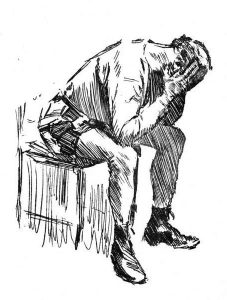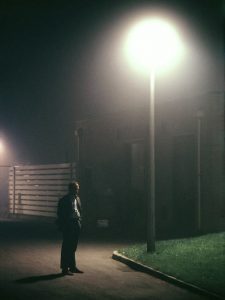Psalm 74 Part 2

Have you ever felt cut off from God? A feeling that you are forgotten? It is a dreadful feeling to consider that God has wiped his hands of you, your chance has gone. Perhaps you have looked around and said to yourself, “If it this bad, God must have turned his back on me.” I am sure that if one is trapped in the middle of a famine with people dying all around or one is fleeing from war as a refugee, then there would be a great temptation to think that God has forgotten you. It doesn’t have to be that sort of situation though, frequently that sense of separation from God is a direct result of our own sin that has not been reconciled and we are living under a weight of guilt with a sense of spiritual oppression.
There are times when those feelings are a bit like physical pain, they are there to prompt us into action, to deal with the underlying cause. If we suffer from leprosy and have lost feeling in our foot, we could be walking with a stone in our shoe that is progressively damaging our foot and causing infection. If only we could feel the pain then we would remove the stone. Similarly, if sin has caused a breakdown in relationship with God it takes conviction of sin to cause us to address the problem.
Psalm 74 describes the psalmist coming to terms with the consequences of sin and rebellion against God at a macro level. The sin of a country’s spiritual leadership and a nation following suit. Judah at the time of the psalm was a picture of devastation. A vastly superior army had gone through the country wrecking it. There was not a concept of human rights at the time, the countryside had been pillaged, the city of Jerusalem was broken down with the temple being the principal focus for destruction. Many of the inhabitants including the fittest, best and brightest were taken into slavery and marched to Babylon. Babylon was the agent for God’s discipline of his own people. It should not have been unexpected, God had repeatedly warned this would be what happened if his own people rejected him for idols and pursued the corrupt practices of those who worshipped foreign gods.
The psalm then opens with a cry of anguish, ‘O God, why do you cast us off forever? Why does your anger smoke against the sheep of your pasture?’ v1 The word smoke evoking the smoke of the burnt temple and the sheep being a term frequently used to describe God’s own people. He then uses a biblical approach to intercession and appeals to God by reminding God of his previous goodness and promises to his people. ‘Remember your congregation, which you have purchased from of old.’ v2 God needs no such reminding but it places the plaintiff in the history of God’s redemption story. We need to do the same thing when we come yet again to him on the basis of Jesus’ sacrifice for us. We then recognize that the only basis for redemption and reconciliation is his goodness and promises. When he asks God to, ‘direct his steps to the perpetual ruins’, v3 he is confessing his own helplessness and yet he knows God cares for his own.
The depth of the damage done by the Babylonian army especially the desecration of the temple is set out in detail. vv 4-9 The Psalmist appeals to God on the basis of surely you do not wish to see Satan and his representatives remain victorious, represented by their placing of signs regarding their idols in the temple. From a New Testament perspective, we know that Jesus has overcome the power of Satan through his death, resurrection and ascension. However, we also know there still remains a conflict for the modern Christian, as James instructed, ‘Submit yourselves, then to God. Resist the devil, and he will flee from you.’ James 4.7 The Psalmist now surveying the temple ruins is in the place where he wants to do just that. However, he has lost a sense of spiritual direction. ‘We do not see our signs; there is no longer any prophet, and there is none of us who knows how long.’ v9
He then appeals to God for the destruction of Judah’s enemies. There do remain times in a modern context where such prayer is appropriate even though it may seem in conflict with praying for one’s enemies. Consider for instance whether one might pray for the destruction of ISIS or Pol Pot’s regime and their genocidal oppression.
Where at the beginning of the psalm he pleads with God to remember, the psalmist now reminds God and by doing so reminds himself and his people of what God has done. vv 12-17 As the Psalmist ranges through the salvation history of Israel and Judah, particularly the Exodus from Egypt, we also need to regularly in prayer revisit our salvation through Jesus.
He concludes with an appeal to God to fulfill his covenant in the salvation of his people who have now become a poor and needy people. ‘Let the poor and needy praise your name.’ Whether we are one of the poor and needy as the Psalmist was or we see the needs of the poor and needy we know that God’s response was to send Jesus his Son.
Have you ever felt the discipline of God?
How would you advise someone who came to you with questions about God’s discipline?
Great Jehovah Official Video – Travis Greene




